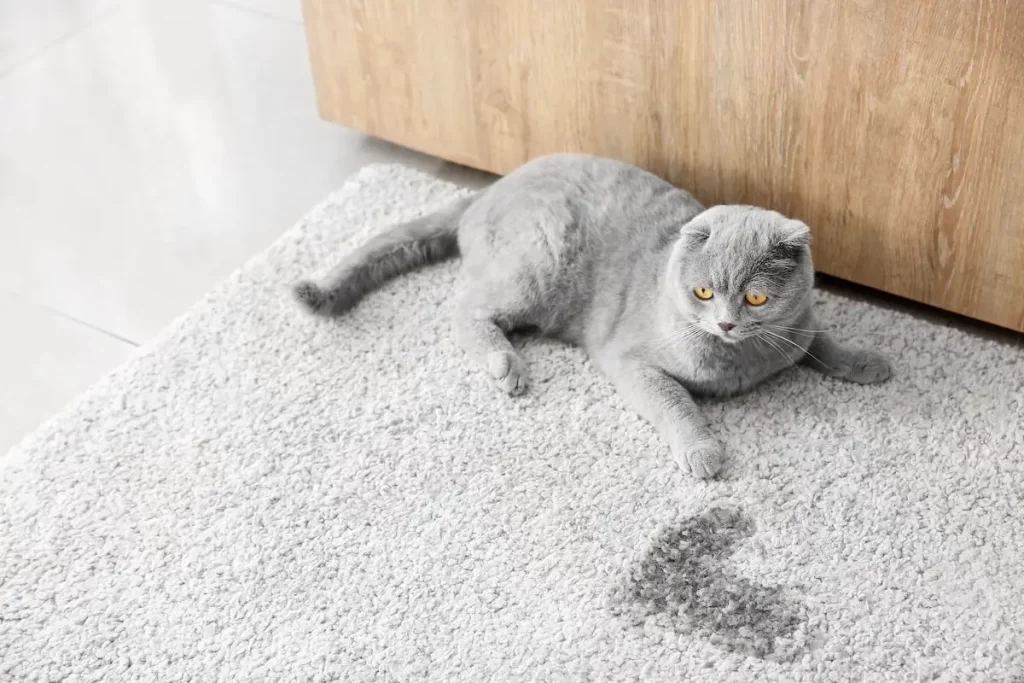Understanding Why Cat Urine Smells So Bad
Cat urine packs a punch because of ammonia, the main culprit behind that nasty smell. The longer it lingers, the stronger it gets. Plus, bacteria thrive in cat urine, breaking down stuff like urea into seriously smelly compounds that stick around.
- Ammonia is not your friend. It's not only pungent but can mess up your surfaces, and breathing in those ammonia fumes is no picnic.
- Urea, a common component in cat urine, transforms into ammonia and other stinky chemicals like mercaptans, amines, and skatoles.
- To make things worse, bacteria love cat urine. They multiply fast and release gases that crank up the stench.
So, here's the deal: to really kick that cat urine smell to the curb, you've got to tackle the ammonia and say goodbye to those bacteria. Scrub the area really well, soak up as much of the urine as possible, and use a pet odor neutralizer or an enzymatic cleaner.
You might need to give it a few go to completely get rid of the mess and that lingering odor.
The secret sauce here is speed - the quicker you act, the easier it is to get rid of the smell. With some diligent cleaning using the right pet odor removal, even strong cat urine smells can be wiped out, and your place will be fresh again. Oh, and don't forget to keep that litter box clean and deal with any kitty behavior issues to dodge those cat urine odors in the first place.
Locating the Source of the Odor
The first thing you've got to do is track down that stinky smell. Check out the spots where your cat hangs out a lot – their litter box spot, bed, scratching post, or anywhere they might have had an "oops" moment.
Take it slow, get down on your hands and knees to really get a good whiff. Sniff carefully along walls, corners, baseboards, and carpets. Look out for any stains that might point to the source of that nasty smell. If it's on a vertical surface like a wall, the odor might have soaked into the paint or the wall itself. You'll probably have to treat and seal that spot.
Once you've pinpointed the source, don't waste time – tackle those stains right away before the smells dig in. For carpet stains, blot with an enzyme-based cleaner and some baking soda. On hard surfaces like tile or wood, give it a good scrub, then disinfect and make it smell nice again.
Litter boxes
If that smell is super strong around the litter box, it's time for a deep clean. Empty out the whole box, give it a good wash with soap and hot water, then rinse it and let it air dry completely. Fill it up with fresh, unscented litter. Also, consider moving the box to a quieter spot away from where you eat.
Don't forget to scoop out the solid waste every day and change the litter regularly to keep those future smells at bay. Keeping your cat's area fresh and free from odors takes some effort, but with regular care, you can kick that cat pee smell to the curb. Deal with messes as they happen, track down and get rid of any existing odors, and make taking care of the litter box a routine. Your nose will be forever grateful!
Removing Cat Urine Stains
Getting rid of that cat urine smell is a bit of a process, but here's how to tackle it:
Find the Source
First things first, you've got to figure out where that stink is coming from. You can use a blacklight to spot cat urine stains, especially on carpets, floors, bedding, and furniture. Look for spots that light up under the blacklight—that's where the cat pee is hiding. You might also need to do some sniffing to track down where the smell is the strongest. Once you've got it, treat that area quickly to stop the smell from getting worse.
Blot and Clean
Start by soaking up as much of the urine as you can using paper towels or old rags. Press down firmly to get as much out as possible. You can also use a wet/dry vacuum to suck up any extra moisture. Then, scrub the area with a mixture of detergent and hydrogen peroxide or white vinegar to get the stain off the surface. If it's a carpet, you might need to rent a carpet cleaning machine to give it a good steam clean.
Apply an Odor-Neutralizer
This is where the magic happens. After you've done your cleaning and blotting, grab an odor-neutralizing product. Look for one with enzymes and bacteria specifically designed to zap away pet odors. Give that area a good spray, following the instructions, and let it soak in. At first, the smell might seem even stronger, but don't worry; that's just the product doing its job to neutralize the odor.
Air Out and Ventilate
Fresh air is your friend in this battle. Keep the area well-ventilated by using fans and opening windows to get that airflow going. You can also place bowls of activated charcoal, coffee grounds, or white vinegar around to help soak up and get rid of any lingering smells in the air.
With some patience and the right cleaning tricks, you can say goodbye to those stubborn cat urine smells. Be persistent in tackling both the stain and the source of the odor. If you keep up with regular cleaning and keep things well-ventilated, the smells will vanish, and your home will smell fresh and clean again.

Neutralizing Cat Urine Odors
To neutralize the smell of cat urine, you need to tackle it at the source. When urine seeps into your carpet, padding, or other materials, it can be a real challenge to get rid of completely. Here are some tips to help you neutralize cat urine odors in your home.
Find the Source:
First things first, you've got to track down exactly where your cat did their business. Look for wet spots or stains on your carpet, floors, or furniture. If you have to, trust your nose to find where the smell is coming from. Once you've got it, act quickly before the urine soaks in all the way.
Blot and Clean:
Soak up as much of the urine as you can by gently blotting with paper towels or old rags. Don't rub; that can push the urine deeper into the material. After blotting, use an enzymatic cleaner like Nature's Miracle to break down those pesky urine proteins that cause the smells. You might have to treat the area a few times to kick that smell.
Baking Soda:
Baking soda is a champion at soaking up and kicking out odors. Sprinkle a thick layer of baking soda right on the soiled area and let it stay for several hours or even overnight. The baking soda will work its magic and neutralize the smell. Vacuum up the baking soda and then give the area another round of enzymatic cleaner to freshen things up. You can also put open containers of baking soda around your house to help with any lingering urine smells in the air.
Steam Clean:
When odors are really set into things like carpets, furniture, or mattresses, steam cleaning is your friend. It helps lift the urine from deep down and brings it to the surface where you can clean and deodorize properly. You might need to do a few rounds of steam cleaning to fully zap the odor. Just make sure everything dries completely to avoid those urine smells coming back.
Seal and Repel:
As an extra layer of defense against your cat using the same spot again, you can use a sealant or repellent like Feliway or orange essential oil. The strong smell will keep your cat away from that area. Reapply as needed to keep the spot smelling fresh and not-so-inviting to your furry friend.
Preventing Future Cat Urine Smells
To stop those unwelcome cat urine smells from making a comeback, you'll need to take some proactive measures.
Remove Attractants
Get rid of anything that might lure your cat back to the soiled spot. Clean up any food crumbs or spills. Cover the area with double-sided tape, aluminum foil, or sticky pads for a couple of weeks to discourage your cat from coming back to that spot.
Clean Thoroughly
Even if you can't spot any leftover urine, your cat might still smell it. That's where an enzymatic cleaner designed to tackle pet urine and odors comes in. Give that area a generous spray, let it soak in, then blot it with paper towels and let it air dry. You might have to do this a few times to completely get rid of the odor.
Make the Area Less Habitable
Consider using motion-activated air sprayers, double-sided tape, or aluminum foil to deter your cat from returning to the area. Additionally, you can try a repellent spray like citrus or eucalyptus oil. To make those spots less appealing, position litter boxes in the areas where your cat typically goes to the bathroom.
Address Any Underlying Issue
Sometimes, inappropriate elimination can be caused by medical or behavioral problems. It's a good idea to take your cat to the vet to rule out any medical issues. Also, check if your cat has access to enough litter boxes that are cleaned daily. Ensure that the litter boxes are not placed in noisy or high-traffic areas. Address any sources of stress or anxiety in your cat's environment that might be contributing to their behavior.
Be Consistent and Patient
Retraining your cat and completely getting rid of odors will require time and consistency. Stick to a routine cleaning schedule, especially for heavily soiled areas. Keep blocking access and using deterrents for at least 4 to 6 weeks. Be patient if there's any regression, and avoid punishing your cat. With time and consistency, your cat should learn not to eliminate in those areas. Staying proactive with prevention and conducting regular spot-checks will help ensure the smells don't come back!
Conclusion
So there you have it, a few simple ways to get rid of that unpleasant cat urine smell from your home. Give these tips a shot and don't get disheartened - it might take a few rounds of treatment to completely kick the odor, especially for persistent issues. The great thing is that these methods are cost-effective, natural, and safe for your cats and family. Stay positive, stay at it, and soon enough, your place will be smelling fresh again. No more cringing when guests drop by or avoiding parts of your home! You've got this. With some effort and determination, you can bid farewell to that cat pee smell. Sweet relief!






